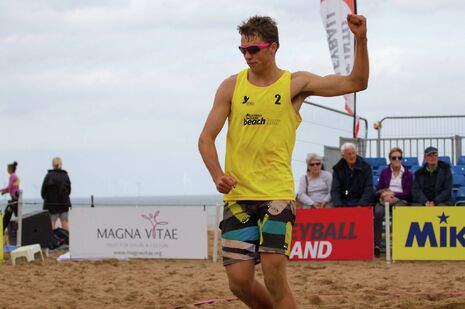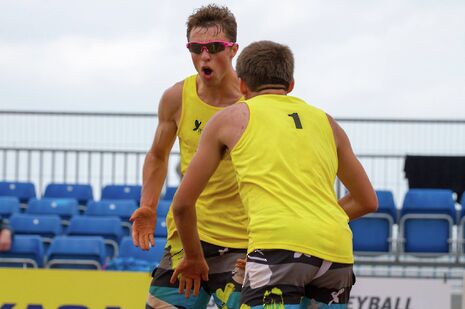Christ’s undergrad makes international beach volleyball debut
Sam Dunbavin made a promising start to his international career with the England team in Oslo, writes Keir Baker

Christ’s undergraduate student Sam Dunbavin, 20, gained his first England beach volleyball cap earlier this month, as he travelled to Oslo to compete in the North European Volleyball Zonal Association (NEVZA) competition.
Kicking off on the 8th September, the competition saw Dunbavin and his partner – University of East London student, Mark Garcia-Kidd – face off against some of the best teams in Northern Europe, with athletes representing Finland, Norway, Denmark and Sweden fighting it out for international points.
Dunbavin, who has been playing since the age of 10, opened his international career against a Norwegian pair in the first round, in a match that proved to be a real battle. With beach volleyball played as the best of three sets to 21, a shaky start by the English duo – particularly by a nervous-looking Dunbavin, who was targeted by the Norwegians – left them with work to do. But a well-timed recovery saw the score hauled back to 19-19, leaving the Englanders well poised to fight for the set. Yet the Norwegians had other ideas and a cheap point gave them the chance to take the set. This they took, with superb defending by junior international player Christian Sørum facilitating a 21-19 set victory.
The second set, too, was a close-run affair. The Norwegians came out strongly, taking advantage of the momentum they had gained from winning the first. Dunbavin and Garcia-Kidd responded with aggression, looking to spike the ball at every opportunity. But the Norwegian pair held onto their lead and remained just out of reach, despite the English duo’s best efforts. Even at set point, with the scores at 20-17, the Englanders fought on, but two well-deserved points from the Englishmen were not enough to rescue the match – the Norwegians took their third set point to clinch the match, 21-19, 21-19.
The English team thus had just one more chance to progress in the tournament, as they faced off against an experienced and very physical Swedish combo. Dunbavin and Garcia-Kidd came out flying in the first set: phenomenal defensive work from Dunbavin saw them take an early 10-6 lead, but the Swedes used their power to slowly reel the English side back in, taking the first set 21-18 and the following set 21-14, thereby sending the England duo out of the tournament.
Speaking to Varsity, Dunbavin – who is currently studying German and Spanish – said afterwards: “While the results from Oslo weren’t exactly what I wanted, what I have shown here is that I can and I will compete on the international circuit. This competition has really inspired me to go on and succeed at this level. I have seen what I need to do to win and I will go away and work on it. Hopefully, this is the first of many such competitions for me!”
This was the culmination of what has been a very successful summer for Dunbavin, who has had what he describes as a “breakthrough year” on the domestic circuit here in England. Indeed, the MML student said he was “thrilled” by his results in the Volleyball England Beach tour, after finishing 3rd, 5th and 5th in three nationwide competition events this year.

Dunbavin has also excelled at volleyball at the student level, representing Cambridge in the Indoor Volleyball Varsity match of 2015 against Oxford, as well as being part of the Cambridge team that finished 5th in the Beach Volleyball Student Cup.
And a very positive start to the season for the Cantabrigian gave him the opportunity to trial for the Great British Universities squad for the World University Championships in Estonia. Although he failed to make the final squad of six, Dunbavin credits this experience as the source of much of his success: “I think the hard work I put in at the start of the season, in the training with the World University Games squad, really stood me in good stead for the rest of the year. A lot of this was going on at the same time as my exams and my studies at Cambridge, so I had to sacrifice a lot of study time and weekends during the Easter term to attend, but it has proved itself worthwhile.”
The training provisions at the University have been a source of great frustration to Dunbavin, and he laments the lack of access to regular beach volleyball training during term time. “I’m forced to choose in Cambridge,” he told Varsity. “Either I play indoor volleyball, or I don’t play volleyball at all. The University and the Council have made no provision for the beach sport here, despite it thriving in other cities and at other universities. I and other beach volleyball players have to travel to Leyton or Brentwood to play, which makes it exceedingly difficult to train more than once a week.”
Indeed, the Devon native has been leading efforts over the last couple of years to get a beach volleyball court built in Cambridge, which he describes as a very infuriating experience. Applications for space and funding have been continually denied by the Council and the University.
“It feels like we’re being stonewalled a bit. We’ve put several applications into the Council now to get a court built here in Cambridge, but they keep refusing to consider the idea. The new University sports centre, too, refuses to add a beach volleyball court to the next phase of their build, despite the fact that they’re building more facilities for sports that already thrive here in Cambridge and that have places to train already, like tennis and swimming. With land at such a premium in Cambridge, we really need one of these two bodies to side with us and back a plan for a beach facility, that I think would not only benefit the University team but the general public, too. Beach volleyball is a hugely attractive sport that is growing fast across the country, with new and successful facilities popping up in Oxford, Cardiff, London and Brighton over the last few years, to name but a few. Cambridge should be looking to emulate this!”
Dunbavin remains optimistic, however, that change will eventually come. He says that he wants his legacy to be a beach court in Cambridge by the time he finishes in 2018. Meanwhile – as he prepares to go to Austria on his year abroad – he has vowed to keep training and keep knocking on the Council’s door, all the while looking forward to his next international appearance.
 News / Christ’s announces toned-down ‘soirée’ in place of May Ball3 February 2026
News / Christ’s announces toned-down ‘soirée’ in place of May Ball3 February 2026 News / Right-wing billionaire Peter Thiel gives ‘antichrist’ lecture in Cambridge6 February 2026
News / Right-wing billionaire Peter Thiel gives ‘antichrist’ lecture in Cambridge6 February 2026 News / John’s duped into £10m overspend6 February 2026
News / John’s duped into £10m overspend6 February 2026 News / Epstein contacted Cambridge academics about research funding6 February 2026
News / Epstein contacted Cambridge academics about research funding6 February 2026 News / Corpus FemSoc no longer named after man6 February 2026
News / Corpus FemSoc no longer named after man6 February 2026










